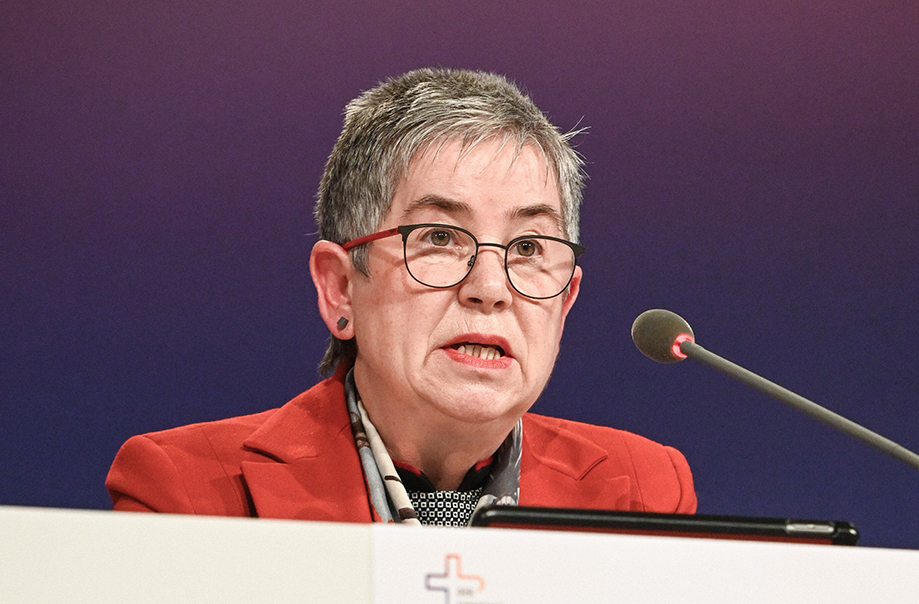




















At its most recent assembly, held last weekend, the Central Committee of German Catholics (ZdK) reaffirmed its determination to pursue its "reformist course." The president of the ZdK, Irme Stetter-Karpexpressed his "fury" over the recent reactions of some bishops and cardinals of the Curia to the decisions of the Synodal Way. Specifically he referred to the Cardinal's reply Arthur RocheThe letter was issued by the Prefect of the Dicastery for Divine Worship and the Discipline of the Sacraments, in a letter dated March 29. The Synodal Way had voted to allow bishops to grant permission for lay people to preach within the celebration of the Eucharist and to administer sacraments such as Baptism, Anointing of the Sick and Marriage.
Cardinal Roche recalled the Instruction "Ecclesiae de misterio" (1997), according to which the homily of a Eucharistic celebration is reserved to priests or deacons, without the diocesan bishop being authorized to grant a dispensation. It also recalled that this instruction spoke of "mission territories" and "cases of special need" for lay people to be extraordinary ministers of Baptism; and warned of a lax interpretation: "It does not appear that such situations exist in any diocese in the area of the German bishops"; therefore, "there is no approved rite in German for the celebration of Baptism by an extraordinary minister".
For Stetter-Karp, this and similar responses mean that "we are experiencing a Church that is characterized at various levels by men who cement their power, reject developments and further deepen the rifts between the Church and the world." This Church - he continued - must come to an end "as an absolutist system of power".
In addition to insisting that the decisions of the Synodal Way be implemented in all German dioceses, he emphasized that the constituent session of the "Synodal Commission" will be held in November. Its creation was decided in September 2022, at the 4th Plenary Assembly of the Synodal Way. Initially it was planned to create a "Synodal Council" which, at the national level, would coordinate the work of the Bishops' Conference (DBK) and the Central Committee of German Catholics (ZdK), and at the diocesan level it would be a governing body with the participation of lay people, who could even impose themselves on the respective bishop. However, the Vatican prohibited - not once, but on several occasions - the creation of such a governing body "at the national, diocesan or parish level".
To get around this prohibition, there was now talk of a "Synodal Commission" which, in addition to preparing the "Synodal Council", would be responsible for resolving questions which, due to lack of time, could not be the subject of the Synodal Assemblies. In order to achieve a fait accompli, the presidents of the Synodal Way -Mons. Georg Bätzing, president of the DBK and Irme Stetter-Karp, president of the ZdK, hastened to set the date for the constituent session of this "Synodal Commission": November 10 and 11. This announcement came as a surprise to the bishops, who had not been consulted before. Rudolf Voderholzer of Regensburg responded by reminding them that the resolutions of the Synodal Assembly are not legally binding in themselves and that a resolution of the Bishops' Conference is required, which also applies to the creation of a "Synodal Commission".
Therefore, Stetter-Karp is now demanding that, in this future body, some of the rules that have hitherto governed the Synodal WayThe requirement that resolutions be adopted with a double two-thirds majority: that of all the assembly members and that of the bishops. Now, the requirement of two-thirds of the bishops would no longer be accepted, since it would mean that a minority of bishops could veto a resolution. She pointed out that a minority of German bishops had expressed in recent months "fundamental doubts about the legitimacy of the path taken". For the president of the ZdK, that would be a "sign of weakness" on the part of the German Bishops' Conference. Matthias Sellmann, a pastoral theologian from Bochum, went even further: the ZdK should now take the lead in the process.
However, the financing of the "..." has yet to be clarified.Synodical Commission"The Standing Council of the German Bishops' Conference was to have taken a decision on the matter in April. The President of the ZdK now expects such a decision to be made in June.
In this context, Helena Jeppesen-Spuhler, who participates in the "support group" for the synodal process in the diocese of Basel (Switzerland) and who had been invited to the ZdK meeting, referred to the fact that, in Switzerland, the decision on finances is not made by the bishops, but to a large extent by lay bodies. Thomas Söding, vice-president of the ZdK, asked, "Why is it not standard practice that those who pay the church tax decide on its use?"












